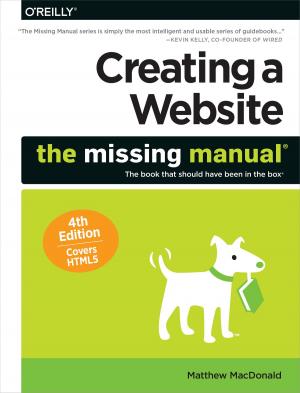The Myths of Innovation
Business & Finance, Economics, Sustainable Development, Development & Growth, Nonfiction, Computers, General Computing| Author: | Scott Berkun | ISBN: | 9780596551452 |
| Publisher: | O'Reilly Media | Publication: | February 9, 2009 |
| Imprint: | O'Reilly Media | Language: | English |
| Author: | Scott Berkun |
| ISBN: | 9780596551452 |
| Publisher: | O'Reilly Media |
| Publication: | February 9, 2009 |
| Imprint: | O'Reilly Media |
| Language: | English |
How do we know if a hot new technology will succeed or fail? Most of us, even experts, get it wrong all the time. We depend more than we realize on wishful thinking and romanticized ideas of history. In the new paperback edition of this fascinating book, a book that has appeared on MSNBC, CNBC, Slashdot.org, Lifehacker.com and in The New York Times, bestselling author Scott Berkun pulls the best lessons from the history of innovation, including the recent software and web age, to reveal powerful and suprising truths about how ideas become successful innovations -- truths people can easily apply to the challenges of today. Through his entertaining and insightful explanations of the inherent patterns in how Einstein’s discovered E=mc2 or Tim Berner Lee’s developed the idea of the world wide web, you will see how to develop existing knowledge into new innovations.
Each entertaining chapter centers on breaking apart a powerful myth, popular in the business world despite it's lack of substance. Through Berkun's extensive research into the truth about innovations in technology, business and science, you’ll learn lessons from the expensive failures and dramatic successes of innovations past, and understand how innovators achieved what they did -- and what you need to do to be an innovator yourself. You'll discover:
- Why problems are more important than solutions
- How the good innovation is the enemy of the great
- Why children are more creative than your co-workers
- Why epiphanies and breakthroughs always take time
- How all stories of innovations are distorted by the history effect
- How to overcome people’s resistance to new ideas
- Why the best idea doesn’t often win
The paperback edition includes four new chapters, focused on appling the lessons from the original book, and helping you develop your skills in creative thinking, pitching ideas, and staying motivated.
"For centuries before Google, MIT, and IDEO, modern hotbeds of innovation, we struggled to explain any kind of creation, from the universe itself to the multitudes of ideas around us. While we can make atomic bombs, and dry-clean silk ties, we still don’t have satisfying answers for simple questions like: Where do songs come from? Are there an infinite variety of possible kinds of cheese? How did Shakespeare and Stephen King invent so much, while we’re satisfied watching sitcom reruns? Our popular answers have been unconvincing, enabling misleading, fantasy-laden myths to grow strong."
-- Scott Berkun, from the text
"Berkun sets us free to change the world."
-- Guy Kawasaki, author of Art of the Start
Scott was a manager at Microsoft from 1994-2003, on projects including v1-5 (not 6) of Internet Explorer. He is the author of three bestselling books, Making Things Happen, The Myths of Innovation and Confessions of a Public Speaker. He works full time as a writer and speaker, and his work has appeared in The New York Times, Forbes magazine, The Economist, The Washington Post, Wired magazine, National Public Radio and other media. He regularly contributes to Harvard Business Review and Bloomberg Businessweek, has taught creative thinking at the University of Washington, and has appeared as an innovation and management expert on MSNBC and on CNBC. He writes frequently on innovation and creative thinking at his blog: scottberkun.com and tweets at @berkun.
How do we know if a hot new technology will succeed or fail? Most of us, even experts, get it wrong all the time. We depend more than we realize on wishful thinking and romanticized ideas of history. In the new paperback edition of this fascinating book, a book that has appeared on MSNBC, CNBC, Slashdot.org, Lifehacker.com and in The New York Times, bestselling author Scott Berkun pulls the best lessons from the history of innovation, including the recent software and web age, to reveal powerful and suprising truths about how ideas become successful innovations -- truths people can easily apply to the challenges of today. Through his entertaining and insightful explanations of the inherent patterns in how Einstein’s discovered E=mc2 or Tim Berner Lee’s developed the idea of the world wide web, you will see how to develop existing knowledge into new innovations.
Each entertaining chapter centers on breaking apart a powerful myth, popular in the business world despite it's lack of substance. Through Berkun's extensive research into the truth about innovations in technology, business and science, you’ll learn lessons from the expensive failures and dramatic successes of innovations past, and understand how innovators achieved what they did -- and what you need to do to be an innovator yourself. You'll discover:
- Why problems are more important than solutions
- How the good innovation is the enemy of the great
- Why children are more creative than your co-workers
- Why epiphanies and breakthroughs always take time
- How all stories of innovations are distorted by the history effect
- How to overcome people’s resistance to new ideas
- Why the best idea doesn’t often win
The paperback edition includes four new chapters, focused on appling the lessons from the original book, and helping you develop your skills in creative thinking, pitching ideas, and staying motivated.
"For centuries before Google, MIT, and IDEO, modern hotbeds of innovation, we struggled to explain any kind of creation, from the universe itself to the multitudes of ideas around us. While we can make atomic bombs, and dry-clean silk ties, we still don’t have satisfying answers for simple questions like: Where do songs come from? Are there an infinite variety of possible kinds of cheese? How did Shakespeare and Stephen King invent so much, while we’re satisfied watching sitcom reruns? Our popular answers have been unconvincing, enabling misleading, fantasy-laden myths to grow strong."
-- Scott Berkun, from the text
"Berkun sets us free to change the world."
-- Guy Kawasaki, author of Art of the Start
Scott was a manager at Microsoft from 1994-2003, on projects including v1-5 (not 6) of Internet Explorer. He is the author of three bestselling books, Making Things Happen, The Myths of Innovation and Confessions of a Public Speaker. He works full time as a writer and speaker, and his work has appeared in The New York Times, Forbes magazine, The Economist, The Washington Post, Wired magazine, National Public Radio and other media. He regularly contributes to Harvard Business Review and Bloomberg Businessweek, has taught creative thinking at the University of Washington, and has appeared as an innovation and management expert on MSNBC and on CNBC. He writes frequently on innovation and creative thinking at his blog: scottberkun.com and tweets at @berkun.















